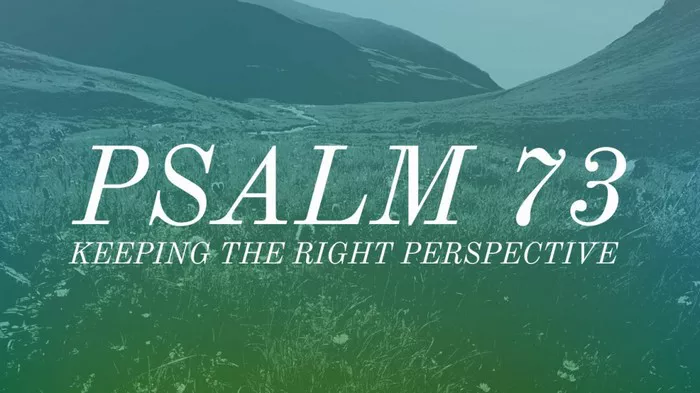In the tapestry of the Psalms, Psalm 73 stands out as a beacon of honesty and introspection. It is a psalm that delves deep into the human experience, grappling with the age-old question of why the righteous suffer while the wicked prosper. Through its verses, Psalm 73 offers profound insights into the nature of faith, the challenges of doubt, and the ultimate triumph of God’s sovereignty.
The Struggle of the Soul
The psalm opens with a raw confession: “Truly God is good to Israel, to those who are pure in heart. But as for me, my feet had almost stumbled, my steps had nearly slipped” (Psalm 73:1-2, ESV). The psalmist, Asaph, candidly admits to wrestling with doubt and envy as he observes the apparent success of the wicked. He describes how he was tempted to question the righteousness of his own path in light of the prosperity of those who flout God’s commands.
The Temptation of Envy
Asaph vividly portrays the allure of envy, confessing, “For I was envious of the arrogant when I saw the prosperity of the wicked” (Psalm 73:3, ESV). He recounts how the wicked seem to enjoy lives of ease and abundance, free from the trials and tribulations that afflict the righteous. This temptation to compare oneself to others and to covet their worldly success is a perennial struggle for believers throughout history.
The Illusion of Prosperity
Yet, as Asaph reflects further, he realizes that the apparent prosperity of the wicked is ultimately fleeting and illusory. He observes, “For they have no pangs until death; their bodies are fat and sleek. They are not in trouble as others are; they are not stricken like the rest of mankind” (Psalm 73:4-5, ESV). The outward trappings of success mask a deeper spiritual poverty, and the seeming security of the wicked is but a prelude to their inevitable downfall.
The Turning Point: Sanctuary Perspective
It is in the sanctuary of God’s presence that Asaph finds clarity and perspective. He writes, “But when I thought how to understand this, it seemed to me a wearisome task, until I went into the sanctuary of God; then I discerned their end” (Psalm 73:16-17, ESV). In the presence of God, Asaph is granted insight into the ultimate destiny of the wicked. He realizes that their prosperity is fleeting and that they are destined for judgment.
The Ultimate Refuge: Trusting in God’s Sovereignty
Asaph concludes his meditation with a resolute declaration of faith: “But for me it is good to be near God; I have made the Lord God my refuge, that I may tell of all your works” (Psalm 73:28, ESV). Despite the trials and temptations he faces, Asaph chooses to place his trust in God’s sovereignty and to find refuge in His presence. He commits himself to proclaiming God’s mighty deeds and to bearing witness to His faithfulness.
Application to Our Lives
The timeless wisdom of Psalm 73 speaks directly to the challenges and struggles we face in our own lives. Like Asaph, we may find ourselves tempted to envy the apparent success of others, to question the fairness of our own circumstances, and to doubt God’s goodness and faithfulness. Yet, as we journey through the psalm, we are reminded of the importance of seeking refuge in God’s presence, of trusting in His sovereignty, and of finding our ultimate satisfaction in Him alone.
Practical Steps for Reflection and Growth
As we reflect on Psalm 73, here are some practical steps we can take to apply its lessons to our lives:
Cultivate a Heart of Gratitude: Instead of focusing on what we lack or on the apparent success of others, let us cultivate a spirit of gratitude for the blessings God has given us.
Seek God’s Presence: Like Asaph, let us make it a priority to spend time in God’s presence, whether through prayer, meditation, or worship. It is in communion with Him that we find clarity and perspective.
Trust in God’s Sovereignty: In the midst of life’s trials and uncertainties, let us trust in God’s sovereignty and His perfect plan for our lives. He is faithful to fulfill His promises and to work all things together for our good.
Bear Witness to God’s Faithfulness: As we experience God’s faithfulness in our own lives, let us be bold and courageous in sharing our testimonies with others. May we proclaim His mighty deeds and His unwavering love to a world in need of hope.
Conclusion
In Psalm 73, we are invited on a devotional journey of honesty, introspection, and ultimately, faith. As we grapple with the age-old questions of suffering and success, of doubt and devotion, may we find solace and strength in the unchanging character of God. He is our refuge and our strength, our ever-present help in times of trouble. Let us, like Asaph, declare with confidence, “Whom have I in heaven but you? And there is nothing on earth that I desire besides you” (Psalm 73:25, ESV).

